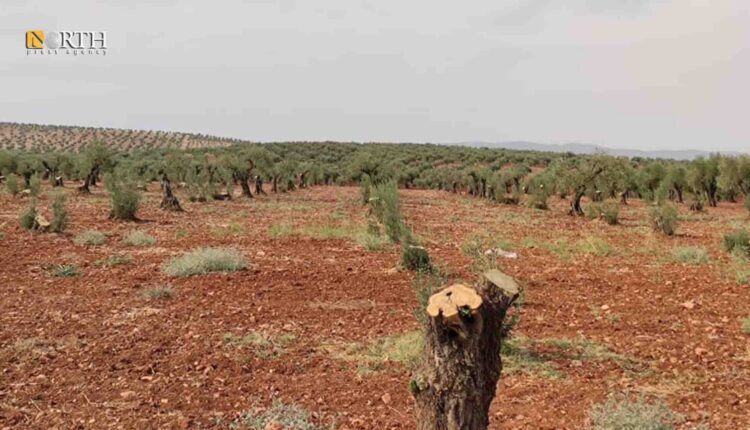
By Taysir Muhammad
AFRIN, Syria (North Press) – Production of olive in the Afrin Region, northwest Syria, has witnessed a grave decline due to several factors, including the displacement of the original inhabitants following the Turkish military operation “Olive Branch” in 2018, logging, robbery, exploitation and imposing royalties on the remaining residents by the Turkish-backed armed opposition factions, aka the Syrian National Army (SNA).
Abdo Abu Jwan, a pseudonym for a resident of Afrin, compares between the decreasing production of olive and its benefits currently and that before the military operation, stressing that all the preceding causes, as well as negligence, and abstaining from plowing lands and spraying fertilizers and pesticides all together resulted in the severe decline.
Abu Jwan told North Press the SNA factions worsened the situation further by seizing vast swaths of lands belong to IDPs, preventing relatives given the power of attorney from looking after them, pruning trees, and cutting trees in turn for firewood.
Moreover, the factions seized lands and properties of civilians, who were displaced during the operation, and olive lands witnessed the largest share of violations since the region mostly cultivated with olive.
The Monitoring and Documentation Department of North Press recorded the logging of 3,664 olive trees since early 2023, of which 2,632 were cut down by Hamza Division, affiliated with the SNA, 680 others by Ahrar al-Sharqiyah, 554 by Sham Legion, 272 by the Sultan Murad faction, and 253 by the Sultan Suleiman Shah Division (al-Amshat).
Afrin has been divided into military areas, with each faction running several villages in light of the insecurity and lawlessness, whereas some villages are run by several factions. As a result farmers become exhausted amid the state of exploitation and robbery of civilians’ harvest under false pretext and charges such as dealing with the Autonomous Administration previously.
In the town of Bulbul in Afrin countryside, run by Sultan Murad faction, Sham Legion, Jaysh al-Nukhba, the Suqour al-Shamal Brigade, and Mu’tasim Division, the imposed royalties on the remaining residents range between 30 and 50 percent of the production, as for lands of the IDPs, the factions have seized them.
Moreover, the factions operate and make benefit from the olive mills in the region.
Royalties in Rajo District, under Ahrar al-Sharqiyah, Sham Legion, Glory Corps, Ninth Regiment, Hamza Division, Liwa al-Shamal, Liwa 112, Muntasir Billah Brigade, Muhammad al-Fateh Brigade, mount to 40 percent of the production.
The factions in the entire region of Afrin steal olives before the harvest time and impose 5 percent royalties on mill owners.
The town of Sheikh al-Hadid falls under the control of al-Amshat that imposes a royalty of between $1 and 3 for each fruitful tree and between 20 and 40 percent on the IDPs’ harvest.
Meanwhile, Jaysh al-Sharqiyah, Samar Qand faction, Sham Legion, Ahrar al-Sham, Nour al-Din al-Zenki Movement, and Hamza Division impose royalties up to 40 percent on agents of the IDPs lands, and between 15 and 25 percent on residents who are still in the region.
Al-Amshat, Muhammad al-Fateh Brigade, Hamza Division, Sultan Murad faction, Ahrar al-Sharqiyah, the Suqour al-Shamal Brigade, and Jaysh al-Nukhba in Mabata district impose royalties of between 20 and 35 percent of the harvest on agents of the IDPs and 20 percent on those in the region.
The factions also prevent the residents from extracting olive oil in mills outside the areas of their control in order to expose royalties on the mills too.
Hanan Hassan, a pseudonym for a resident of Mabata, told North Press that the main problem they face when harvesting olive is “the big tax imposed by al-Amshat, which is estimated at $3.5 for each tree, 12 percent of the production, and seven percent on mills the faction assigns.”
Hassan added, “These royalties make our shares of the production become less than the half, and let alone other due expenses we pay including wages of workers and others.”
As for lands affiliated to Afrin city, there are additional expenses paid for guarding crops, add to them 30 percent royalties on the IDPs lands, 20 percent on lands of those still live in the region, and other royalties on mills.
Owners of lands are forced to guard their crops at night or to early harvest for fear of theft.
The same is witnessed in Sharan District, where Sultan Murad faction, Malak Shah faction, Sham Legion, Jaysh al-Nukhba, Hamza Division, and Shahba Gathering are operating, royalties are estimated at 35 percent of the harvest imposed on agents of the IDPs and 20 percent on the residents, in addition to seizing olive crops of IDPs who have not given power of attorney to their relatives.
Shiyar Ali, a pseudonym for a mill owner in Afrin, told North Press, “Sultan Murad faction is heavily restricting our work and lists of the registered names, consequently, farmers lost trust because militants always exist within the olive mills.”
Ali added that the task of these militants is to “monitor the harvest brought in, aiming at cutting the amount imposed on the olive owners.”
